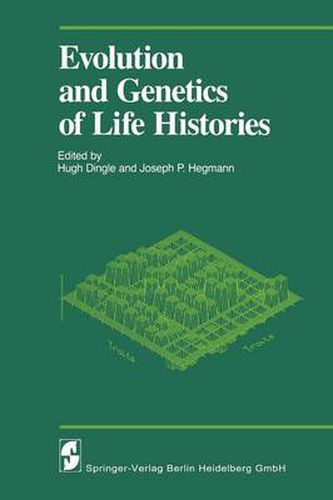Readings Newsletter
Become a Readings Member to make your shopping experience even easier.
Sign in or sign up for free!
You’re not far away from qualifying for FREE standard shipping within Australia
You’ve qualified for FREE standard shipping within Australia
The cart is loading…






This title is printed to order. This book may have been self-published. If so, we cannot guarantee the quality of the content. In the main most books will have gone through the editing process however some may not. We therefore suggest that you be aware of this before ordering this book. If in doubt check either the author or publisher’s details as we are unable to accept any returns unless they are faulty. Please contact us if you have any questions.
This volume is the result of a symposium entitled "Variation in Life Histories: Genetics and Evolutionary Processes" sponsored by the Program in Evolutionary Ecology and Behavior ofthe University of Iowa and held in Iowa City on October 13 and 14, 1980. Prompted by arecent upsurge of interest in the evolution of life histories, we chose this topic because of the obvious association between life history traits and Darwinian fit- ness. If such an association were to be fruitfully investigated, it would require the eloser cooperation of population and evolutionary ecologists and quantitative and population geneticists. To encourage such an association, our symposium had four major aims: first, to facilitate intellectual exchange across disciplines among an array of biologists studying life histories; second, to encourage exploration of genetic variance and covari- ance for life history traits; third, to consider the ecological background for genetic vari- ability; and finally, to facilitate a comparative overview both within and among species. Obviously such broad aims cannot be met totally in a single volume, but we think we have succeeded reasonably wen in providing a representative and nourishing intel- lectual feast. We see this book as a stimulus to the coordination of future efforts in an important and expanding area of inquiry. We have divided the book into six sections.
$9.00 standard shipping within Australia
FREE standard shipping within Australia for orders over $100.00
Express & International shipping calculated at checkout
This title is printed to order. This book may have been self-published. If so, we cannot guarantee the quality of the content. In the main most books will have gone through the editing process however some may not. We therefore suggest that you be aware of this before ordering this book. If in doubt check either the author or publisher’s details as we are unable to accept any returns unless they are faulty. Please contact us if you have any questions.
This volume is the result of a symposium entitled "Variation in Life Histories: Genetics and Evolutionary Processes" sponsored by the Program in Evolutionary Ecology and Behavior ofthe University of Iowa and held in Iowa City on October 13 and 14, 1980. Prompted by arecent upsurge of interest in the evolution of life histories, we chose this topic because of the obvious association between life history traits and Darwinian fit- ness. If such an association were to be fruitfully investigated, it would require the eloser cooperation of population and evolutionary ecologists and quantitative and population geneticists. To encourage such an association, our symposium had four major aims: first, to facilitate intellectual exchange across disciplines among an array of biologists studying life histories; second, to encourage exploration of genetic variance and covari- ance for life history traits; third, to consider the ecological background for genetic vari- ability; and finally, to facilitate a comparative overview both within and among species. Obviously such broad aims cannot be met totally in a single volume, but we think we have succeeded reasonably wen in providing a representative and nourishing intel- lectual feast. We see this book as a stimulus to the coordination of future efforts in an important and expanding area of inquiry. We have divided the book into six sections.